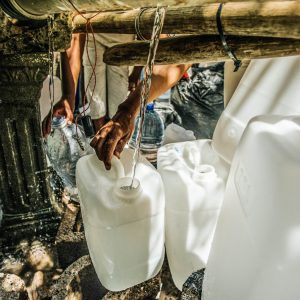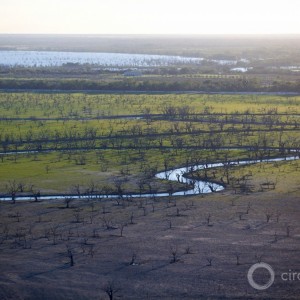Federal Water Tap, November 4: House Committee Advances $23.4 Billion Wastewater Infrastructure Bill
The Rundown
The Trump administration reportedly is preparing to relax coal ash rules. Sen. Jim Inhofe releases a pared-down version of a Defense authorization bill that omits contentious PFAS provisions. The Senate passes an EPA budget that marginally increases funding, while a House committee approves a bipartisan bill to increase authorized spending for sewer infrastructure. The Supreme Court is scheduled to hear a closely watched Clean Water Act case from Hawaii. The Trump administration releases a five-year plan for the Great Lakes Restoration Initiative. The U.S. Geological Survey assesses groundwater availability in the Ozarks Plateau. A court-appointed special master will hold an evidentiary hearing in the long-running legal dispute between Florida and Georgia over a shared watershed. And lastly, the EPA’s internal watchdog begins assessing plastic pollution prevention under the Clean Water Act.
“Everyone knows it’s going to pass. So consequently people put more and more things on the bill, many things that have nothing to do with the military, because they know that the bill is going to pass…This bill is simple. It extends necessary authorities for military operations, takes care of service members and their families and authorizes essential military construction and acquisition programs. That’s it…Because at the end of the day, that’s what we have to do by the end of the year.” — Sen. Jim Inhofe (R-OK), speaking on the Senate floor about his “skinny” National Defense Authorization Act. The bill has been held up by negotiations between the House and Senate over provisions related to PFAS chemicals, which have contaminated drinking water sources and are connected to the military’s use of firefighting foams. The House version requires the chemicals to be designated as hazardous under the federal Superfund law.
By the Numbers
$9 billion: Funding for the U.S. Environmental Protection Agency in fiscal year 2020, an increase of $161 million, or 1.8 percent, from last year. The bill, which passed the Senate, included amendment authorizing more funding for wastewater treatment projects on the U.S.-Mexico border and for rural decentralized wastewater systems. The Senate must now confer with the House. The government is operating under a short-term funding authority that lapses on November 21. (Senate)
$23.4 billion: Funding authorized over five years for various clean water and sewage programs under a bipartisan bill introduced in the House. The largest chunk of money from the Water Quality Protection and Job Creation Act goes toward capitalizing the Clean Water State Revolving Fund, the government’s main low-interest loan fund for wastewater infrastructure. The bill authorizes $4 billion a year for five years, which is more than double current appropriations. (House Transportation)
News Briefs
Coal Ash Rules
The Trump administration, in the coming days, will relax requirements for toxic ash produced while burning coal to generate electricity, the New York Times reports.
The rules, which have already been postponed by the U.S. Environmental Protection Agency, were developed during the Obama administration.
Often stored in pits at electric power plants, coal ash contains heavy metals such as arsenic, cadmium, and mercury that can leach into groundwater and enter rivers and lakes, where it is detrimental to fish.
Studies and Reports
Ozarks Groundwater Assessment
The U.S. Geological Survey published a report on groundwater availability in the Ozarks Plateau, an aquifer system that spans Arkansas, Missouri, eastern Oklahoma, and southeastern Kansas.
The biggest uses of groundwater in this area are for public utilities and domestic wells, and the aquifer is the drinking water source for 2 million people.
Preventing Plastic Pollution in U.S. Waters
The EPA Office of the Inspector General will begin an audit of the Clean Water Act’s capacity to prevent plastic pollution in the nation’s waters.
Great Lakes Restoration
The Trump administration released its implementation plan for the next five years of the Great Lakes Restoration Initiative, the federal government’s main environmental program in the region.
The plan focuses on cleaning up contaminated sites, halting invasive species, reducing the release of new pollutants, and rebuilding habitat.
On the Radar
Supreme Court to Hear Clean Water Act Case
On November 6, the U.S. Supreme Court is scheduled to hear oral arguments in a case about the scope of pollution permitting under the Clean Water Act.
The case centers on a wastewater treatment plant on Maui and whether it needs a Clean Water Act permit for disposing of its effluent. If the plant discharged the effluent directly into the ocean, the answer would be clear: Yes. Those discharges are definitely covered by the act.
But the Lahaina Wastewater Reclamation Facility injects its effluent into wells. The effluent then moves through groundwater and into the ocean, where it has fed algal blooms. Federal appeals courts have issued contradictory rulings on whether this indirect discharge of pollutants, through groundwater, requires a permit.
The case is further complicated by internal politics. The Maui County Council voted to settle the lawsuit and avoid a Supreme Court showdown. But Mayor Michael Victorino claims he has final authority and is not willing to settle.
In context: Maui Mayor Rejects Clean Water Act Settlement, Aims for Supreme Court Hearing
Florida v. Georgia Hearing
On November 7, Florida and Georgia will resume their decades-long dispute over a shared watershed. Lawyers for the two sides will meet for an evidentiary hearing at the U.S. District Courthouse in Albuquerque.
The Supreme Court, in June 2018, sent the case back to a court-appointed “special master,” who is overseeing the fact-finding portion of the lawsuit. The court found the initial report lacking in detail and too strict in its proposed remedies. A new special master is overseeing the remanded case.
Federal Water Tap is a weekly digest spotting trends in U.S. government water policy. To get more water news, follow Circle of Blue on Twitter and sign up for our newsletter.
Brett writes about agriculture, energy, infrastructure, and the politics and economics of water in the United States. He also writes the Federal Water Tap, Circle of Blue’s weekly digest of U.S. government water news. He is the winner of two Society of Environmental Journalists reporting awards, one of the top honors in American environmental journalism: first place for explanatory reporting for a series on septic system pollution in the United States(2016) and third place for beat reporting in a small market (2014). He received the Sierra Club’s Distinguished Service Award in 2018. Brett lives in Seattle, where he hikes the mountains and bakes pies. Contact Brett Walton






Leave a Reply
Want to join the discussion?Feel free to contribute!